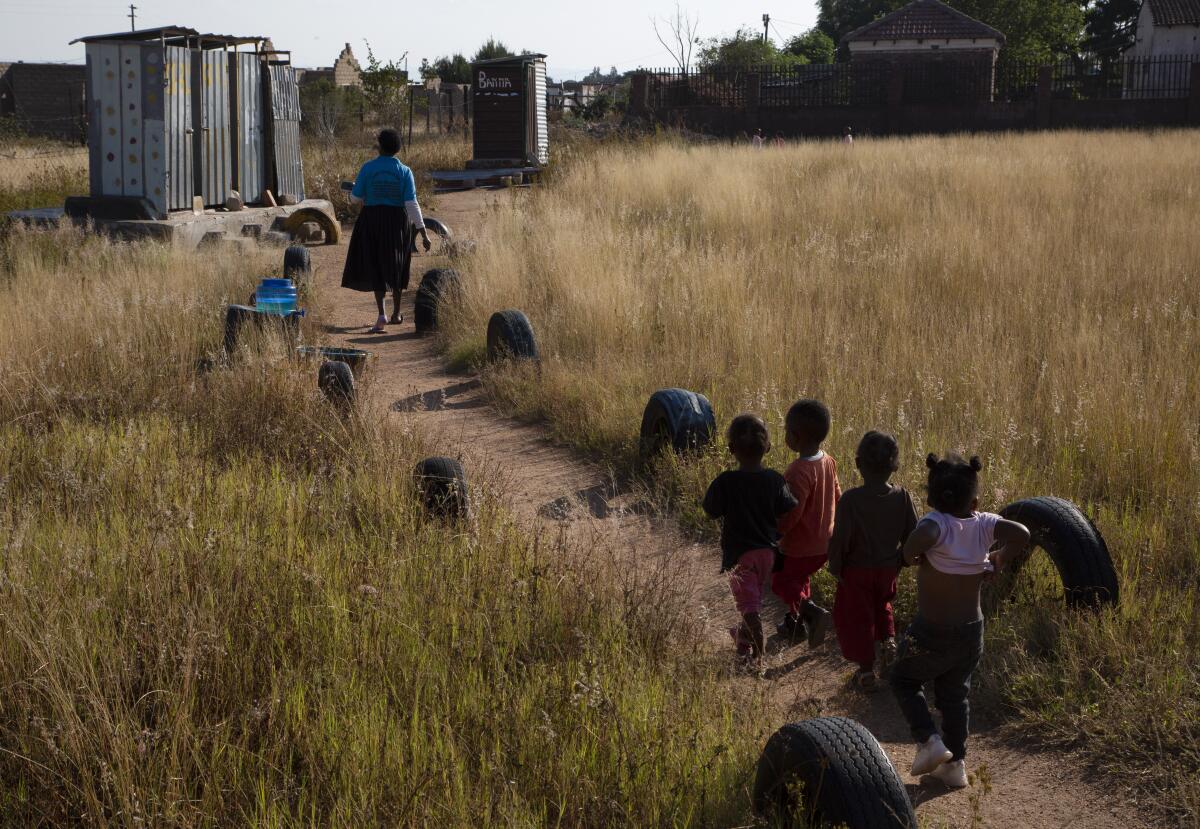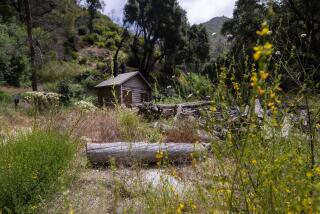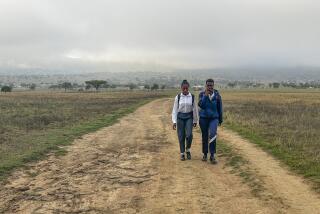Dignity denied as more than 3,000 schools in South Africa still use pit toilets

- Share via
GA-MASHASHANE, South Africa — At a high school in rural northern South Africa, more than 300 students and their teachers share three toilets, and that woefully lopsided figure isn’t the worst problem.
The three toilets are pit latrines, effectively 10-feet-deep holes in the ground where students line up during a lunch break to use.
The pit toilets at Seipone Secondary School in the village of Ga-Mashashane at least are covered by white toilet seats and enclosed by brick structures. Some of the pit toilets still used at more than 3,300 schools in poor, mostly rural areas across South Africa aren’t.
It’s a shameful situation for a country referred to as the most developed in Africa, and an indicator of its profound problems with poverty and inequality, say human rights groups pushing the South African government to do away with the substandard facilities in schools forever.
Unhygienic, the latrines also present a much more direct danger.
The sight that greeted James Komape one day in January 2014 at the nearby Chebeng village is horrific by every measure.
He’d received a phone call asking him to rush to his 5-year-old son’s preschool. The little boy, Michael, was found dead, drowned at the bottom of a pit latrine. Michael’s body hadn’t even been removed from the pool of water mixed with feces and urine at the bottom of the pit he fell into when his father got there.
“What hurt me a lot about Michael’s incident is that the people who were there saw that he had fallen in the toilet, but they did not remove him,” said James Komape. “They said they were waiting for the responsible authorities to come and remove him. I told them that if they had removed him quickly maybe he could have survived.”
It was Michael Komape’s first week at a new school and his dreadful death incensed many South Africans. His family took the Limpopo province’s education department to court and won their case seeking damages. Later, court orders compelled the South African government to urgently address the issue of pit toilets in schools.
But the tragedy of Michael Komape has not been unique. Other small children have also drowned in pit latrines in the near-decade since, one girl as recently as last month, another boy in March. There are no reliable figures to say how many children have lost their lives in pit toilets.
The latrines, which have an outlet that is used to drain them periodically, are cheaper and more practical for poorer schools because they don’t rely on a constant supply of running water.
At the Jupiter Pre-School and Creche in the same Limpopo province where Michael died, children as young as 3 are still using pit toilets that have no proper seat but, rather, a hole carved out of a concrete slab that opens to the pit below.
“These are not good because of possible accidents of children falling in the toilet,” the school’s manager, Florina Ledwaba, said. “We have to follow them [the children] every time. What if they go without you seeing them? They are not safe at all.”
The Equal Education human rights group has been inspecting pit toilets in South African schools. Tiny Lebelo, an organizer with the group, expresses frustration over an issue that should be a top priority for government — the safety of children at their schools — and still hasn’t been resolved.
The South African government promised to replace all pit toilets at schools nationwide by March 31 this year. It hasn’t happened. Basic Education Minister Angie Motshekga said there are still 3,398 schools using pit latrines and the deadline to eradicate them has been shifted to 2025.
Lebelo said that “it speaks about how we perceive people in rural areas.”
“What we are saying about them is that they don’t deserve dignity, that’s why we’re not going to provide you with a basic toilet. We’re not going to give that to you because already you’ve been using it [pit toilets],” she said. “So, what’s another year, or two years, or 10, or decades? We’re saying to them you’re not worthy of dignity.”
Section27 is another human rights group pushing for the pit toilets to be eradicated for “safe and decent sanitation facilities.” Section27 supported Michael Komape’s family in their legal action against the local and national education departments, and they succeeded in getting a court ruling that authorities must provide updated information every six months on schools in the Limpopo province using pit toilets and the plans to replace them.
Section27 called its system to track the government’s work the Michael Komape Sanitation Progress Monitor and it is able to use the information to hold the education department accountable.
The department has made some progress by reducing schools using pit toilets in Limpopo from 363 in 2021 to 210 schools now. But James Komape said the government hasn’t kept its side of an agreement to remove pit toilets and “many children are still in real danger.”
At the Seipone Secondary School, the pit toilets are officially called ventilation improved toilets, and known as “VIP toilets.” They are anything but. There is anger and now pushback from students, too.
“Our health also matters, [we] cannot use toilets like these,” said Tebogo Makgoka, a 17-year-old student representative.
More to Read
Sign up for Essential California
The most important California stories and recommendations in your inbox every morning.
You may occasionally receive promotional content from the Los Angeles Times.










